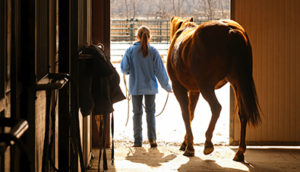Read the latest information on
Foot-and-mouth disease
 A case of Hendra virus in the Hunter Valley in northern New South Wales has prompted AHA to issue a reminder to horse owners on the importance of biosecurity and early reporting of diseases.
A case of Hendra virus in the Hunter Valley in northern New South Wales has prompted AHA to issue a reminder to horse owners on the importance of biosecurity and early reporting of diseases.
The emergency animal disease, which is often fatal to both horses and humans, had never been seen in the Hunter region previously.
“Hendra has been a horse owners’s nightmare since it emerged in Queensland in 1994,” said Dr Simon Humphrys, AHA’s Executive Manager Biosecurity and Product Integrity.
“Around four in five horses infected either die of the infection or have to be euthanised. Thankfully, it’s not a highly contagious disease.”
The natural host of the Hendra virus is the flying fox, who show no signs of the virus when infected. It is strongly suspected that horses become infected by coming into contact with infected flying fox saliva, blood, urine or droppings, and through direct contact between horses.
Although it’s rare, humans can also become infected with Hendra through close contact with infected horses.
“When dealing with a sick animal, simple precautions can drastically reduce the risk of contracting not just Hendra but any zoonotic disease,” Dr Humphrys explained.
“Wearing gloves, goggles and a face mask, and practicing good hygiene (e.g. washing your hands and face), can limit your contact with infectious material.”
There is no evidence of Hendra virus passing from person to person.
While a case of Hendra will not trigger a livestock standstill, as a declared emergency animal disease it would result in government intervention (quarantining, testing of horses, vaccinations) on the property and in the surrounding area. Despite this, Dr Humphrys wants to reassure people that reporting a suspicious case is always the best course of action.
“Getting on top of a disease outbreak early makes it much easier to manage and reduces the risk of more animals or people being exposed to the disease,” he said.
“The old adage holds, prevention is far better than cure, so biosecurity practices are a must.”
Vaccinating horses against the virus will provide a high level of protection. However, should a horse fall sick it should be isolated and tested.
Common signs include fever, depression, difficulty breathing, confusion and unsteadiness.
Keeping horses away from trees frequented by flying foxes (such as fruit trees), ensuring their feed and water isn’t being fouled by flying fox droppings, and turning over feed bins for the night can help prevent horses from being exposed to the virus, which cannot live long outside of a host.
“While Hendra is a serious disease and often fatal, it’s fortunately not as mobile as some other emergency animal diseases,” Dr Humphrys explained.
“This makes it more easily prevented and or managed through simple biosecurity and hygiene practices.”
Horse owners wanting to know more about biosecurity for their property can visit the Horse industry page of the Farm Biosecurity website.